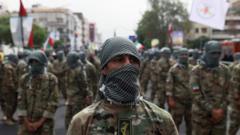Recent reports indicate a significant uptick in Iran’s plots to target dissidents and political rivals, prompting police investigations in multiple countries.
**Iran's Covert Operations: Criminal Gangs for Global Hit Jobs Exposed**

**Iran's Covert Operations: Criminal Gangs for Global Hit Jobs Exposed**
Court documents reveal Iran's Revolutionary Guards allegedly hiring organized crime for international assassinations.
Iran's expanding web of covert operations has come to light, as a series of court documents reportedly demonstrate the Islamic Revolutionary Guard Corps (IRGC) engaging criminal organizations for assassination plots abroad. These revelations have intensified scrutiny from Western intelligence agencies, as targeted individuals include journalists and political dissidents.
Since 2022, there has been a notable surge in Iranian plots aimed at exiles, with notable alleged targets including Donald Trump and dissidents residing in the UK. Law enforcement in the UK is currently investigating Iranians arrested in connection with plans for a terror attack aimed at the Israeli embassy in London.
The court documents, which have surfaced from Turkey and the US, indicate that the Iranian regime has allegedly employed criminal gangs to execute killings overseas, despite Iran's firm denials of such claims. Among the names that arise frequently in these documents is that of Naji Sharifi Zindashti—an Iranian criminal figure notorious for drug smuggling.
Zindashti's shadow looms large, particularly in connection with the assassination of Saeed Karimian, the head of a Persian TV network. Authorities considered Karimian a threat to Islamic values, and he was sentenced in absentia shortly before he was murdered. Intriguingly, Zindashti's ties to the Iranian intelligence apparatus have sparked speculation regarding his prior legal troubles and eventual escape from Turkey.
Journalist Cengiz Erdinc, who has extensively investigated this nexus of crime and state, asserts that Zindashti's presence at murder scenes involving rivals of the Iranian regime is far from coincidental. He described a long-standing collaboration between organized crime and Iranian intelligence services.
Further complicating the narrative, Zindashti has reappeared in several criminal cases over the years. He was implicated in a high-profile kidnapping of an Iranian dissident in Turkey, which later led to the victim's televised confession and subsequent execution. Indicatively, Zindashti's operations stretched beyond just Turkey, involving alleged plots in the US against Iranian defectors.
Alarmingly, the IRGC's connections to organized crime networks like the notorious Thieves-in-Law are also evident. This collaboration reportedly facilitated sophisticated operations, including recent assassination attempts on Iranian-American activists who have criticized the regime.
The reciprocal nature of these threats has led to increased sanctions from the US and UK on individuals connected to these criminal undertakings, including Zindashti himself. Reports indicate that as recently as 2024, the UK has experienced numerous credible threats tied to the Iranian regime, leading to heightened security concerns for dissidents.
The past also weighs heavily on Iran’s approach to covert operations, with historical precedents of international assassinations echoing through Iranian politics. The 1992 killing of Kurdish leaders in Berlin directly implicated the Iranian government, showcasing a troubling legacy of violence that continues to reverberate today.
Despite the intricate web of Iran's operations, experts like Matt Jukes emphasize the potential for law enforcement to penetrate these organized crime networks, given the lack of ideological allegiance to the Iranian state. This ongoing battle against a "creeping penetration" by Iran highlights the persistent threat posed by organized crime, as well as the broader implications for global security.




















